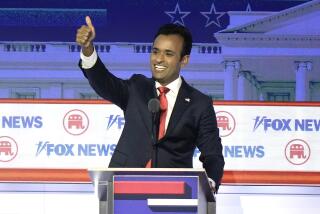Who’s Who in the Hoosier Debate : Quayle vs. Webster Over True Meaning of a Sacred Word
- Share via
On March 30, 1987, Sen. Alfonse M. D’Amato of New York took the Senate floor to predict that his alma mater, Syracuse University, would win the NCAA basketball championship by beating the Indiana University Hoosiers that night.
Good-natured sports chauvinism is common on Capitol Hill; hundreds of such speeches have been delivered there. But in this case D’Amato invoked a word sacred to Indiana: Hoosier.
The New York Republican noted that Webster’s Third New International Dictionary defined the word not only as meaning an Indiana native, but also “an awkward, unhandy or unskilled person, especially an ignorant rustic.”
There also was a verb--”to hoosier”--which the dictionary defined as “to loaf on or to botch a job.” D’Amato used this verb to predict the defeat of the Indiana team; if they hoosiered the game, he said, “Syracuse will be victorious.”
Senate Rule XIX
Neither of Indiana’s senators was present, but Sen. Robert Byrd of West Virginia did interrupt D’Amato to note Senate Rule XIX, according to which a senator can be asked to take his seat if he speaks disparagingly of another state. “That would never be my intention,” D’Amato said.
That night Syracuse lost to Indiana, 74-73.
The next day Indiana Sen. Dan Quayle, now the Republican vice president-elect, took the floor to congratulate the team and offer a nonbinding resolution redefining Hoosier.
“(Be) it resolved,” his resolution read in part, “that a Hoosier is someone who is smart, resourceful, skillful, a winner, unique and brilliant.”
It sounded like more spirited Senate tomfoolery. Quayle even said he would take up Hoosier with the dictionary people. Everybody probably assumed he was having more fun.
Highly Regarded
But later that week, Quayle wrote to William A. Llewellyn, president of the Merriam-Webster Co., which publishes Webster’s Third. The dictionary, whose first edition appeared in 1890, is one of the nation’s more highly regarded reference works. Though it has drawn solid competition in recent decades, many regard it as the authoritative voice of American English.
Quayle asked that the derogatory definitions of Hoosier be removed from the dictionary, and he suggested his own upbeat substitute. Llewellyn said Quayle asked that if the negative definitions were retained, a full discussion of the term’s lingual history be included as well.
Llewellyn politely replied that the problem with Quayle’s request is that a dictionary reflects the way words are actually used. Should Quayle’s definition become common usage, Llewellyn said, the company would be delighted to have the entry reflect the change.
As for printing Hoosier ‘s etymology, he noted in a telephone interview that Webster’s Third is not an etymological dictionary.
Battle of the Verbs
When it received Llewellyn’s reply, Quayle’s office took the matter beyond the creation of definitions to the creation of verbs. Quayle press secretary Peter Lincoln put out a statement promising to carry on the Hoosier battle, and offering the new verb, to webster , which Lincoln said meant “to mis-define a word stubbornly and outrageously.”
Was Webster’s Third mis-defining Hoosier ? If anything, Webster’s treatment was mild compared to the word’s usage in Kentucky and Missouri.
Elaine Viets, a St. Louis Post-Dispatch columnist, said the word “is highly pejorative and means a low-life redneck.” Viets says you can always recognize Hoosiers, because “they have a car on concrete blocks in the front yard and are likely to have shot their wife, who may also be their sister.”
Thomas E. Murray of Ohio State University, writing in a scholarly journal, identified Hoosier as St. Louis’ “No. 1 term of derogation,” while Merriam-Webster’s immense files held evidence dating to 1850 of the use of Hoosier to mean a lazy rustic.
Stymied, Quayle’s office threatened Webster’s Third with expulsion. The Indianapolis Star reported that a copy of the book remained in the office but quoted Peter Lincoln as saying that “when the senator returns from vacation, I need to ask whether he wants a different dictionary in there.”
There the matter remains. Reached last week, Lincoln, who no longer works for Quayle, said that the threat of banning Webster’s Third was done “tongue-in-cheek.”
The rest of the controversy, Lincoln says, was entirely “on the level.”
More to Read
Sign up for Essential California
The most important California stories and recommendations in your inbox every morning.
You may occasionally receive promotional content from the Los Angeles Times.













